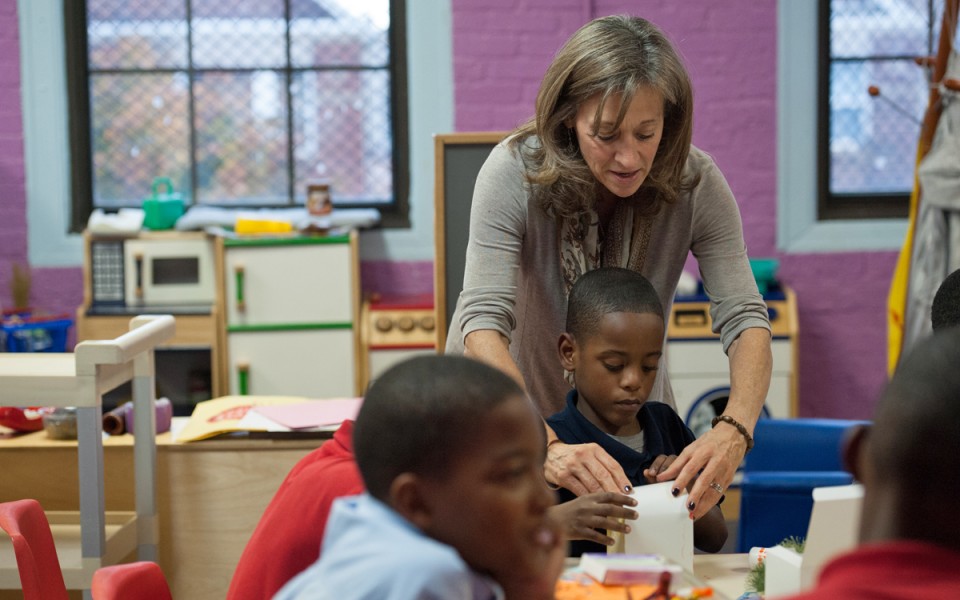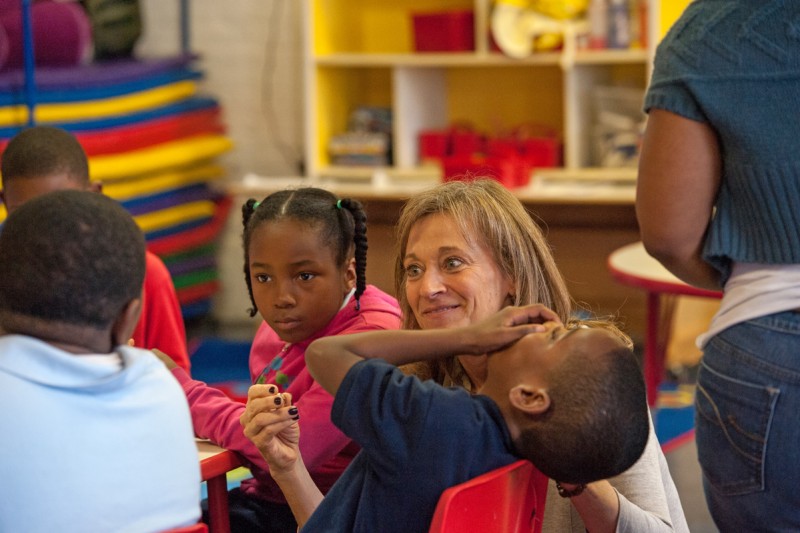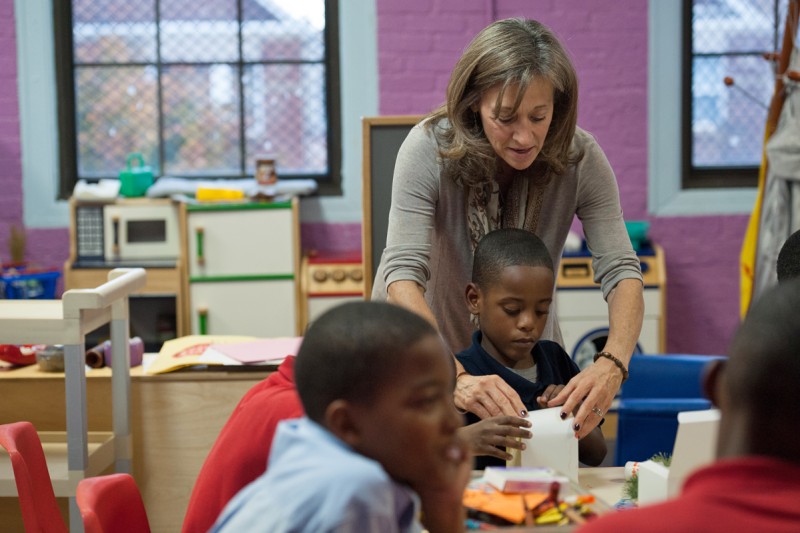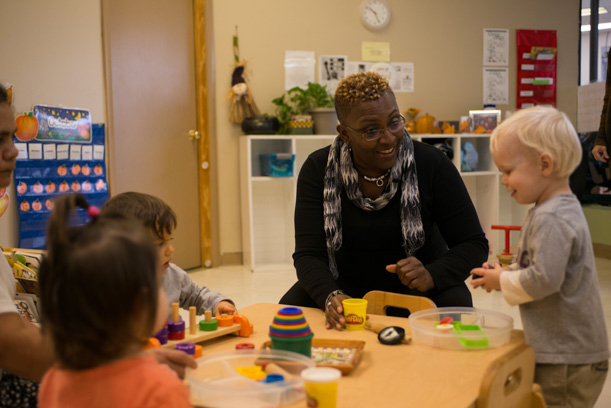Expelled in preschool

Preschoolers are expelled at three times the rate of their older peers. Here’s what to do about it — and how to support the mental health of all kids
CHICAGO — A few years ago, 4-year-old Danny was on the verge of being expelled from a Chicago preschool for violent behavior when a woman named Lauren Wiley was called in to help.
She met with the boy’s teacher, who thought he needed to be medicated for attention deficit disorder. But as Wiley listened, the teacher admitted she was angry at Danny, whose name has been changed to protect his identity. Her job was to keep her students safe, she said, and the boy’s aggression made her feel like a failure. Next, Wiley and the teacher met with Danny’s mom. As the teacher dropped her judgmental attitude, it came out that Danny had watched his father beat his mother and get taken away in handcuffs. No one had ever talked to the child about what he saw. He did not have ADD. He was reeling from trauma, and he needed his teacher to like him and want to help him, not to be rid of him. That began to happen when she heard his story.

An after-school program run by Chicago Youth Centers has seen significant improvement in children’s behaviors since staff began working with Lauren Wiley, an early childhood mental health consultant.
Wiley is an early childhood mental health consultant. The job title often evokes an image of a baby on a couch talking to a therapist, but her work is about listening to adults so they can create an emotionally healthy environment for children. She trains teachers and others who work with young children to recognize the trauma that so often causes misbehavior. She supports them in confronting cultural biases and forging relationships with parents. She shows them how to recognize families’ strengths and promote mental wellness before problems develop. This is particularly significant since we know that “adverse childhood experiences” like violence and family dysfunction predict everything from academic failure to cancer to heart disease.
In 2005, Yale professor Walter Gilliam shocked the nation with the first research showing that preschoolers are expelled at three times the rate of children in kindergarten through 12th grade. He showed that young African-American boys like Danny are most vulnerable to what he calls “the capital punishment of schools.”
Gilliam convened focus groups of teachers to find out why, in mixed-age classes, he was seeing 4-year-olds expelled at higher rates than 3-year-olds in the same rooms. The replies were consistent: The teachers perceived the 4-year-olds as more likely to hurt someone when they misbehave because they are physically bigger.
“That’s when it dawned on me that expulsion is not a child behavior. It’s an adult decision,” said Gilliam, who spoke on the topic at a Dec. 10 White House summit on early childhood education.
He realized that, for the problem to get better, teachers need help managing challenging behavior.

As an early childhood mental health consultant, Lauren Wiley travels around the state of Illinois to various settings serving young children. At this after-school program run by Chicago Youth Centers, she works with students older than her usual clientele of birth to 5.
Gilliam has zeroed in on the consultation intervention as a particularly promising and cost-effective approach: In a Connecticut study, he found that it reduces preschool expulsions by half. It also has been shown to improve the emotional well-being of all children in the pivotal years before kindergarten and boost staff retention and job satisfaction in an industry with rampant turnover.
With that research base from preschools, consultation now is being tried in home visiting programs, domestic violence shelters, pediatrician’s offices — anywhere that serves young children. There are also early efforts to bring a similar service to older kids.
Under the nation’s newly reauthorized child care funding legislation, states must develop plans to reduce preschool expulsions, and consultation is now an allowable expense. The U.S. Department of Health and Human Services announced $4 million in December to expand the intervention’s reach. Head Start and Early Head Start programs already require it, and there are about a half-dozen state programs, as well as numerous regional ones. Still, the vast majority of early childhood settings do not have routine access to consultants, according to Georgetown professor Deborah Perry, who directed the National Center for Early Childhood Mental Health Consultation.
Related: The earliest intervention: How to stop the achievement gap from starting?

Lauren Wiley (right), an early childhood mental health consultant, guides a teacher to talk to a girl about her emotions at an after-school program run by Chicago Youth Centers.
I recently spent two days shadowing Lauren Wiley in Illinois, one of the places with a statewide program. She’s a petite 55-year-old who puts 500 to 700 miles a week on her silver Acura, a distance she says is only possible because her own two kids are grown. One of our stops was in Chicago’s violent North Lawndale neighborhood at an after-school program in an immaculately-kept old building with a “no firearms” sticker on the door. Wiley had made weekly visits there since early 2014 to address the mental health needs of students ages 7 to 11, older than her usual clientele.
She had been encouraging the program’s director and two teachers to focus on what the children can do, not what they can’t. This simple strategy led the staff to uncover one troubled 11-year-old’s love of verbal storytelling. By asking him to tell and then illustrate the story of his life — which includes frequent neighborhood shootings, a recent murder on his block and teasing for a minor facial deformity — he took an interest in writing his life story as well. As a result, he is reading for the first time, and mortifying accidents wetting his pants are far fewer. A handmade poster lists his coping strategies: “deep breaths,” “fan myself,” “take a time out,” “sit quietly by myself.”
On the day we visited, the teachers watched as Wiley had the eight children present decorate boxes to fill and empty with small bells based on acts of kindness and cruelty. She noticed a few coloring in red and then trying to erase it and perceived the imagery of a blood stain that won’t come out. She prodded a teacher to pull a little girl aside to talk.

Lauren Wiley helps a boy decorate a box he will fill and empty with small bells based on acts of kindness and cruelty in his life.
Early childhood mental health consultation can look like this, with a consultant and teacher working together with children, modeling lessons for each other. Or it can just look like adults sitting around a table, as we saw at a day care, where a conversation about suspected parental drug use led Wiley to a bigger probe: Do all staff members believe the mothers they serve can be good parents? While no one wanted to admit bias, and Wiley never acts like she has all the answers, she had clearly unearthed a problem, and a fundamental one. Child care and preschool expulsions are virtually unheard of when the teacher and parent know and like each other.
Sometimes, consultants can offer relatively simple fixes. According to Georgetown’s Perry, teachers make the common mistake of giving directions while standing up; young children, particularly those with concentration difficulty, are more likely to listen to an adult at their eye level. Consultants watch how teachers navigate activity changes — think taking a dozen 3-year-olds to the bathroom — since those are the most common times for behavioral outbursts to occur. They suggest things like signing a clean-up song every day so kids will anticipate and understand routines.
More difficult are the situations requiring changes in adult attitudes and habits, and that’s where Wiley spends most of her time. She said it is common for home visitors to pick up and calm fussy babies, alienating mothers who don’t know how to soothe them or have traumatic memories tied to their own childhood cries. In an agency focused on mental wellness, she said, the home visitor might instead put an arm around the insecure mom holding her baby and tell her: “When I’m not here, I want you to remember that I’m with you. My arm is around you. You can do it.”
Related: The power of preschool done right
The consensus is that effective consultation must include supervisors, both to support staff on the front lines and so that when there is turnover, the work isn’t all lost. Wiley says she needs to be in a place at least a year, and preferably two, to shift an organization’s mindset. Results for individual children and classrooms can happen faster, but Wiley gets incensed when her peers address what she calls the “low-hanging fruit” — a child’s misbehavior — without training the staff what to do. She sees her role as creating a safe space for early childhood professionals to reflect and explore ideas. “The hardest part is sitting with your own discomfort sometimes while people figure it out for themselves,” she said.
Wiley is an independent contractor. Many of her assignments come from the Illinois Children’s Mental Health Partnership, an agency the state created in 2003 in response to research showing that more than 20 percent of children have a diagnosable mental health condition, but only one in five of those are treated.

Regina Le Flore, owner of Little People Montessori in Lyons, Ill., says she would love more strategies to help children with significant behavior problems stay enrolled at her center.
The partnership has received $200,000 a year in state money to provide early childhood mental health consultation free to any agency that requests it, as capacity allows, along with $270,000 in federal money to consult in home visitation programs. By conservative estimates, it reached 59 programs last fiscal year with the state funds and used the federal dollars to serve 139 home visitors and supervisors serving 1,490 families. A little money has gone a long way, and other organizations receive government funding for similar services. But with resources few and needs great, the work is not heavily promoted, and many who could benefit don’t know it exists.
Regina Le Flore, who owns a Montessori day care and preschool in the western Chicago suburb of Lyons, said she would love for her teachers to have more training in what to do when children develop significant behavior problems. That typically happens once or twice a year and usually results in their withdrawal, often with their parents acting defensive when the staff suggests the child needs counseling. (A consultant would recommend avoiding accusations that can make a parent feel like a failure.)
Related: A grandmother’s quest to overcome early learning barriers
To take consultation to scale, those in the field agree there needs to be a model delineating what quality looks like and a bigger workforce with a rare combination of skills: experience as a mental health professional, knowledge of child development, cultural awareness, and an understanding of families and of trauma. But those things would come if there were steady government funding.
Wiley, an Illinois native who lives 60 miles south of Chicago in a small town called Bourbonnais, is one of the most seasoned consultants in the state, with more than a decade of experience. She says her greatest asset is curiosity, a trait she tries to get her clients to adopt in their interactions with families.
When Danny’s teacher dropped her assumption about what was wrong and listened receptively to his mother, the whole situation shifted. They worked together to find a classmate he could play with quietly, to let him change activities when he couldn’t focus and to help his mother say goodbye when she dropped him off each morning. Earlier, she would sneak away because she couldn’t handle watching him melt down.
And one moment at a time, supportive adult behavior paved the way for a child to remain in school.
This story was produced by The Hechinger Report, a nonprofit, independent news organization focused on inequality and innovation in education. Read more about early childhood education.
A version of this story was published by The New York Times on Feb. 20, 2014.
Reproduction of this story is not permitted.

